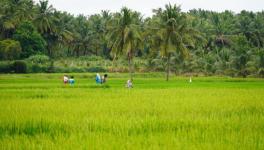Tax Issue Prevents Small Coffee Growers from Moving up in Value Chain
Image for representational use only.Image Courtesy : The Hindu
The issue of taxation is preventing small coffee growers from graduating to sellers of an intermediate product to augment their income and improve the quality of their life. Repeated pleas for reconsideration remain unheeded by the Union government.
In India, 99% of coffee growers come under the category of small holders, but significantly, they account for 70% of coffee production. Karnataka tops the list and Kerala follows it. Tamil Nadu is a distant next to Kerala. The Northeast has emerged as a non-traditional area.
In the prevailing circumstances, small coffee growers are unable to realise remunerative value from the sale of their produce which, in reality, are raw coffee beans. They sell their produce to “middlemen”, who in turn carry out other activity including curing to make the coffee beans marketable. Their realisation from international buyers is much higher. The price advantage on sale of cured coffee vis-a-vis sale of fruit coffee ex-farm gate is somewhere between 10 and 15%.
Tracing the legislative history of income-tax (I-T) on coffee sale, a note prepared by UPASI, the umbrella organisation of planters in South India, points out that by the first notification dated February 28, 2001, the Central Board of Direct Taxes (CBDT) had inserted Rule 7B under the I-T Rules, 1962. It was provided therein that income derived from sale of coffee grown by a person and manufactured by him with or without adding ‘Chicory’ would be treated as ‘Business Income’, 40% of which will be taxed under the I-T Act, 1961 and the remaining 60% will come under the purview of State Agricultural Income-tax (AI-T) Acts.
By the second notification dated June 19, 2002, the CBDT amended Rule 7B, inserted Rule 7B (1) and stipulated that 25% of income derived from sale of coffee grown and cured would be taxed under the I-T Act 1961. It was also stipulated that 40% of the income derived from sale of coffee grown, cured, roasted and grounded with or without mixing ‘chicory’ or other flavoured ingredients would be taxed under the I-T Act 1961.
Coffee growers who were hitherto filing returns under state AI-T enactments were required to file returns under I-T act 1961. There is lot of dissatisfaction among them, especially those who are at present exempted from paying AI-T and those who have opted for composition tax under the said enactments. Because of either exemption or option for composition tax, they have not been maintaining books of accounts.
The other problem is that those who have opted for composition tax will, in addition to their obligations under the state AI-T enactments, have to pay tax on agricultural income excluded from tax under the I-T Act 1961. That means they would be subjected to double taxation, pointed out UPASI’s advisor Ullas Menon while explaining the situation to NewsClick. As a result, many of the small growers, who were all this while selling coffee after curing it under prescribed specifications, started to sell coffee in the raw form, which have been impacting realisation and quality factors.
Coffee, as an agricultural produce, undergoes various processes. The ripe fruit is pulped, washed and dried after plucking from the garden and thereafter it undergoes further cleaning and grading in the curing works. The process of curing is an intermediate stage and the cured matter is not fit for human consumption. It is only after roasting and grinding, it is consumed as a beverage.
Menon further pointed out that in India an agriculturist who grows coffee, tea and / or rubber has to pay I-T. This situation contrasts with other agriculture produce which undergoes various processes (similar to coffee) to make the produce fit for human consumption but there is no levy of I-T at an intermediate stage. For example, paddy which undergoes a process of curing.
Urging the Union government to treat cured coffee as an agricultural produce only, the UPASI note quotes from Encyclopaedia Britannica to buttress its contention and demand revisiting rule 7B (1). Encyclopaedia Britannica defines coffee as a “beverage made from the roasted seeds (beans) of the coffee plant. The said beverage is consumed either as a hot or cold drink and is considered to be having an invigorating effect”.
UPASI has also quoted Section 2 (29BA) of the I-T Act 1961 which defines manufacture with its grammatical variations. “Manufacture means a change in a non-living physical object or article or thing, resulting in transformation of the object or article or thing into a new and distinct object or article or thing having a different name, character and use or bringing to existence of a new and distinct object or article or thing with a different chemical composition or integral structure”.
For the record, it may be mentioned that India’s coffee production stood at 316,000 tonnes in 2017-18, in which Arabica had a share of 95,000 tonnes and Robusta 221,000 tonnes. The estimates for 2018-19 are 319,500 tonnes (total), 95,000 tonnes (Arabica) and 224,500 tonnes (Robusta).
The shares of small holdings, which account for 70%, are 221,200 tonnes and 223,660 tonnes respectively for 2017-18 and 2018-19 respectively. The balance, 30%, represent the shares of large holdings. As is known, the Coffee Board of the Union government has the responsibility for the overall development of the sector.
Get the latest reports & analysis with people's perspective on Protests, movements & deep analytical videos, discussions of the current affairs in your Telegram app. Subscribe to NewsClick's Telegram channel & get Real-Time updates on stories, as they get published on our website.
























